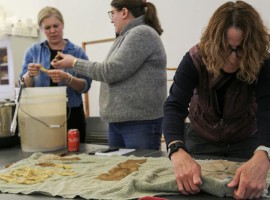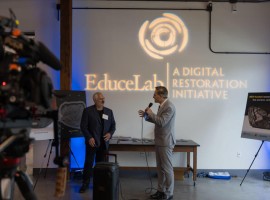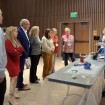UK Fulbright Scholar Researches Anemia in Peruvian Children

Ana Maria Linares, associate professor in UK’s College of Nursing, traveled to Peru this past March 2019 to research the cause of iron-deficiency anemia in Peruvian children at the National University of San Luis Gonzaga. Linares’ four-month trip was sponsored by the Fulbright Scholar Program, which offers over 800 teaching, research or combination teaching/research awards in over 125 countries.
Linares came to the United States from Chile in 2009 to join the faculty at UK’s College of Nursing, teaching obstetric nursing in the undergraduate program. According to Linares, her 10 years at the University of Kentucky helped her expand her knowledge on various research initiatives and curriculum, as well as educational resources that are readily available to students and staff.
“I am an experienced professor so I thought it was the right time to share my knowledge,” Linares said. “I was especially interested in going to Peru because I speak perfect Spanish so I knew I would be able to successfully communicate with others while being there.”
In 2017, Linares attended an academic conference focused on human lactation. At this conference she learned that nearly 50 percent of Peruvian children younger than three years old have anemia. This is something that inspired Linares to conduct a research project in Peru surrounding iron-deficiency in children.
“A lot of my research is in human lactation, women’s health, children health— so learning this statistic caught my attention,” Linares said. “I started asking why and no one was able to answer, so I did some research and learned there was very limited information and publication on this topic.”
With the help of Peruvian educators and nursing professionals, Linares collected breast-milk, blood and stool samples from local women and children. Then, through cross-disciplinary collaboration with experts in the fields of toxicology and genetics, Linares tested the samples to determine anemia-causing factors that had not been previously discovered.
During her time researching abroad, Linares also taught two seminar classes in qualitative and quantitative research at the National University of San Marcos and other universities across Peru. Through her teaching experience, Linares was able to share her research with professors and several doctoral students.
According to Linares, these seminars were eye-opening for students, and sparked the conversation surrounding improvement of healthcare and the discipline of science in Peru.
“I felt so happy. It’s beautiful—I felt really humbled that I was able to share the knowledge that I have been learning through my research and through the UK College of Nursing with many people over in Peru,” Linares said.
Through the Fulbright Scholars Program, Linares learned that supporting developing countries through international collaborative research can bring monumental change to the lives of many people. Her research and teaching not only positively impacted the professors, doctoral students and healthcare professionals who she worked with, but also the many families and children effected by anemia in Peru.
The Fulbright Program is the flagship international educational exchange program sponsored by the U.S. government and is designed to build lasting connections between the people of the United States and the people of other countries. Over the past two decades, more than 90 UK faculty members have been awarded Fulbright grants to teach and conduct research in 48 different countries and more than 30 visiting Fulbright scholars from around the world have chosen the University of Kentucky and Lexington as their home away from home.
For more information on Fulbright opportunities, visit the UK International Center’s website





